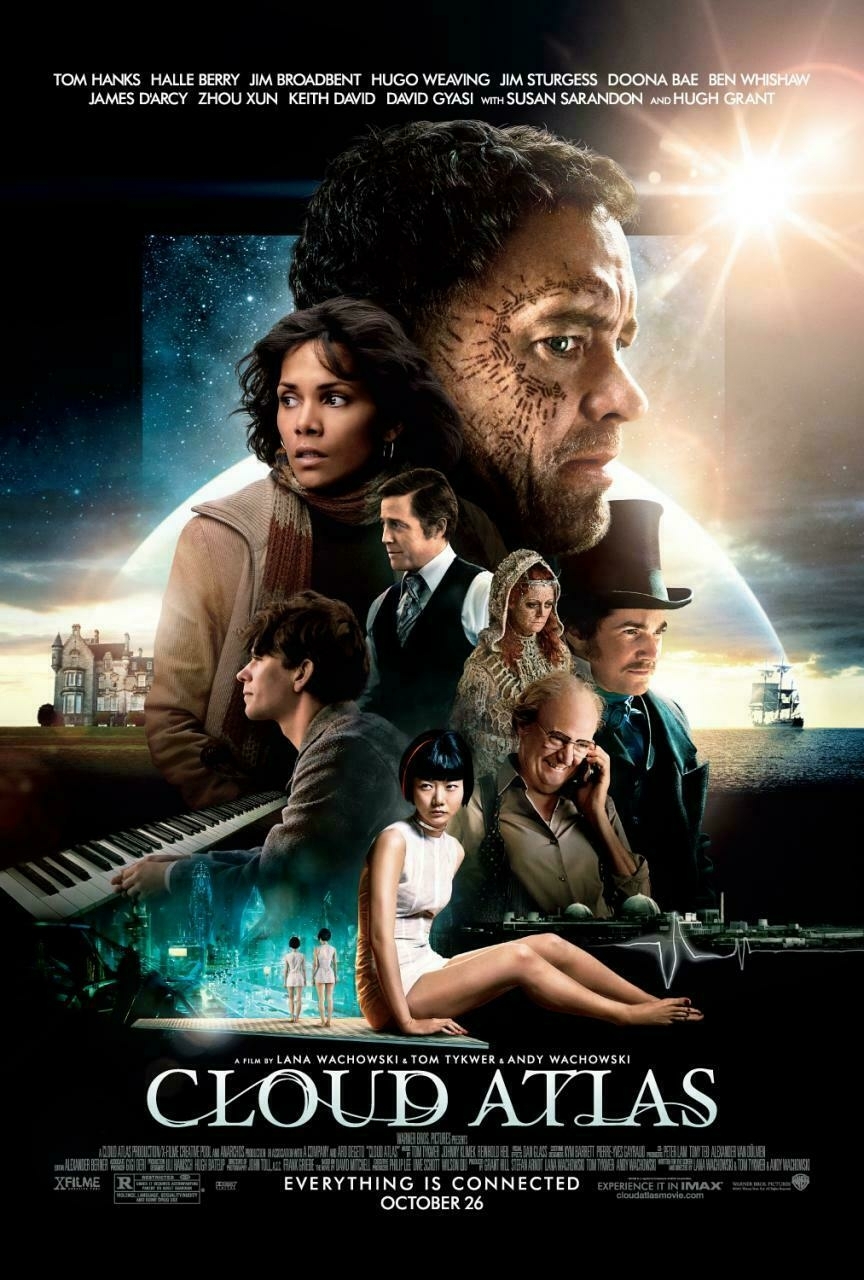Long Form
Cloud Atlas (2012): A Review
Cloud Atlas is a difficult movie.
On paper, a nearly three-hour drama which takes the audience through six separate timelines while attempting to reveal the universal truths of humanity isn’t the easiest pill to swallow. Yet from the first glimpse of the film, in its beautiful six-minute trailer, you got the feeling that the directorial team of Lana and Andy Wachowski (The Matrix) and Tom Tykwer (Run Lola Run) had truly touched upon something special.
Cloud Atlas isn’t really easy to describe.  The movie shifts and shakes from one story to another. You have a story of a lawyer in the 1800’s, a composer in the 1930s, an investigative journalist in the 1970s, a publisher in modern-day, a cloned restaurant server in 2144 and a post-apocalyptic world, set “106 years after ‘The Fall’”.  Actors appear and reappear in different timelines, not as the same characters however. Some switch from the hero to the villain, some change race, some even change sex, but the idea is to reveal a universal truth of humanity. Our lives are always intrinsically linked, between love, life and death, we are always combined and our stories start to fall together.
Each story goes down a different path - the modern-day story of a book publisher quickly becomes a humorous escape film, the story of the cloned server lives up to its Blade Runner-esq set design and develops into a sci-fi tale about freedom, our lawyer in the 1800’s becomes the catalyst for the freedom of a slave, the 1970’s investigative reporter becomes embroiled in a pitch perfect crime drama. There’s barely a genre not represented here. The sheer scope and scale of the project is enough to engulf you. Not enjoying where the story on-screen is going? Don’t worry, they will be cutting back to the other soon. Pain is met with humor, triumph is met with defeat, closure is met with the opening of a new door. It’s an amazing achievement in editing, and somehow with all these stories told over such a long period of time, you never feel like the film is dragging.
It’s clear that the filmmakers were more enamored with certain timelines than others (the Neo Seoul sequence in 2144 clearly had the Wachowski’s creative juices flowing), but no story feels cheapened. Somehow, every story has a clear three act structure, and usage of creative juxtaposition clarifies the meaning of certain stories by the sequences that came before or follow from other stories. The uniting theme of the connective fiber of life itself becomes abundantly clear, and while every story seems unique, each story illuminates the next in brilliant, unforeseen ways.
Much has been spoken of the creative use of a central cast throughout the film, using extensive makeup techniques to allow the actors to morph into different roles depending on the timeline they appear in. Sometimes the makeup does a fantastic job of hiding the actors (you’re going to have a lot of fun with the IMDB page when you get home), while in others, the makeup is jarring and bizarre (notably with any instance of changing an actor’s race or sex).  Still, the acting is the heart of the project. Tom Hanks goes from a conniving doctor to a brilliant nuclear scientist to a British gangster to a post apocalyptic survivor, and is believable in each role.  Hallie Berry is fantastic as a reporter in the 1970s, but unfortunately is almost forgettable in her other parts along the way. The true stand out has to be Jim Broadbent, who is given two absolutely meaty roles, as both a lost composer with a mean streak and a bumbling buffoon of a book publisher.  If he isn’t at the least nominated for an Oscar as best supporting actor for his work here, something has gone terribly wrong.  Oh, and I’d be remiss if I didn’t mention that if you’ve ever longed to see what Hugo Weaving would look like if he were Nurse Ratched from One Flew Over The Cuckoos Nest, this is the film that finally delivers.
Not every beat of the film is perfect, however. Besides the aforementioned issues with certain makeup jobs, there are some very odd choices in storytelling, and at times the acting even devolves to camp (I’m looking at the imaginary voodoo devil played by Hugo Weaving in the post-apocalyptic era). Some stories you wish were full films of their own, and while you are given the complete story, you’re left wanting for more detail.
Hours after the credits rolled, I find myself still dissecting and pondering the film. This is not a movie for everyone, nor do I believe that everyone will love it.  Unfortunately, I’m not familiar with the source material (a novel by David Mitchell), so I cannot speak to the quality of the translation.  What I do know is this -  Cloud Atlas is a truly epic undertaking in film-making  As you let the film wash over you, all you can do is admire the scope and scale of what is being attempted, even if the landings don’t hit as hard as you will hope.
The Wachowskis and Tom Tykwer had the audacity to create something truly brilliant and original, in a movie making marketplace which may completely refuse to accept it. Cloud Atlas is a film which I look forward to dissecting and discussing for years to come - and that may truly be the highest compliment you can pay a true work of art.  Is the movie for you? I cannot really say. But I know that it was for me, and I look forward to revisiting it again and again.

Wednesday October 24, 2012